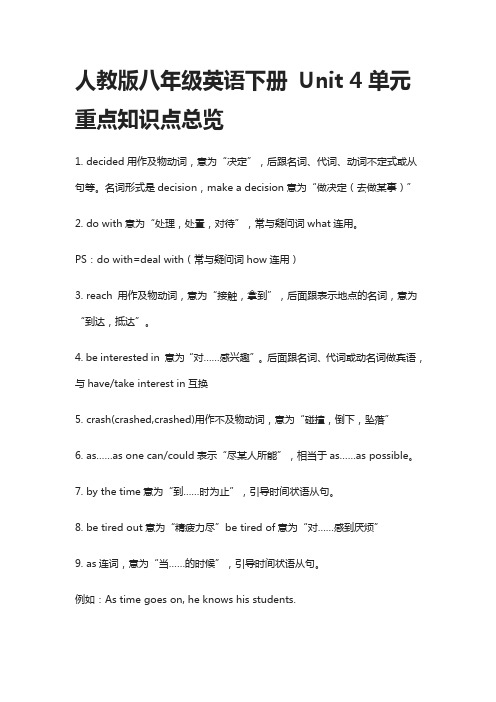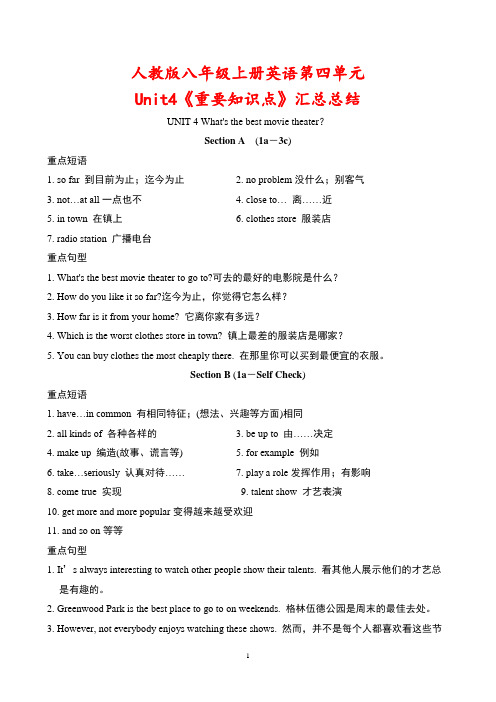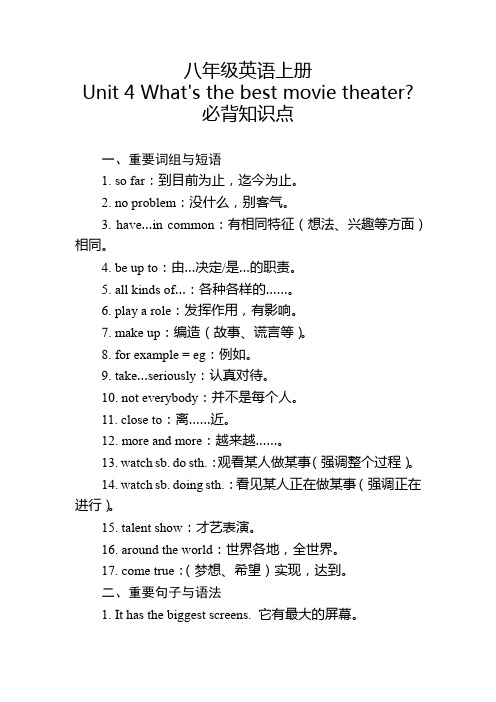初二英语Unit4知识点
人教版八年级英语下册 Unit 4单元重点知识点总览

人教版八年级英语下册Unit 4单元重点知识点总览1. decided用作及物动词,意为“决定”,后跟名词、代词、动词不定式或从句等。
名词形式是decision,make a decision意为“做决定(去做某事)”2. do with意为“处理,处置,对待”,常与疑问词what连用。
PS:do with=deal with(常与疑问词how连用)3. reach 用作及物动词,意为“接触,拿到”,后面跟表示地点的名词,意为“到达,抵达”。
4. be interested in 意为“对……感兴趣”。
后面跟名词、代词或动名词做宾语,与have/take interest in互换5. crash(crashed,crashed)用作不及物动词,意为“碰撞,倒下,坠落”6. as……as one can/could表示“尽某人所能”,相当于as……as possible。
7. by the time意为“到……时为止”,引导时间状语从句。
8. be tired out意为“精疲力尽”be tired of意为“对……感到厌烦”9. as连词,意为“当……的时候”,引导时间状语从句。
例如:As time goes on, he knows his students.10. tie(tied,tied,tying)用作及物动词,意为“捆,绑,系”,tie…to…意为“把……系/捆到……上”。
be tired to是它的被动语态,意为“被捆到……上”11. until用作连词,意为“直到……为止”,在(某一特定的时间)之前,其主要用法有:与延续性动词连用时,表示“直到……”,动词用肯定形式,指主句的动作一直持续到until后的动作发生为止;not…until…意为“直到……才……”,主句动词通常为非延续性动词,指主句的动作一直到until后的动作发生时才发生。
12. the same size as…意为“和……一样尺寸,与……一样大小”。
人教版八年级上册英语第四单元Unit4《重要知识点》汇总总结

人教版八年级上册英语第四单元Unit4《重要知识点》汇总总结UNIT 4 What's the best movie theater?Section A(1a-3c)重点短语1. so far 到目前为止;迄今为止2. no problem没什么;别客气3. not…at all一点也不4. close to… 离……近5. in town 在镇上6. clothes store 服装店7. radio station 广播电台重点句型1. What's the best movie theater to go to?可去的最好的电影院是什么?2. How do you like it so far?迄今为止,你觉得它怎么样?3. How far is it from your home? 它离你家有多远?4. Which is the worst clothes store in town? 镇上最差的服装店是哪家?5. You can buy clothes the most cheaply there. 在那里你可以买到最便宜的衣服。
Section B (1a-Self Check)重点短语1. have…in common 有相同特征;(想法、兴趣等方面)相同2. all kinds of 各种各样的3. be up to 由……决定4. make up 编造(故事、谎言等)5. for example 例如6. take…seriously 认真对待……7. play a role发挥作用;有影响8. come true 实现9. talent show 才艺表演10. get more and more popular变得越来越受欢迎11. and so on等等重点句型1. It’s always interesting to watch other people show their talents. 看其他人展示他们的才艺总是有趣的。
仁爱英语八年级上册unit 4的知识点

仁爱英语八年级上册unit 4的知识点Unit 4是仁爱英语八年级上册的一个重要单元,本单元的主题是“地球村”,主要内容包括国际会议、计划和国际组织等。
在学习本单元之前,建议学生们先了解一些有关国家、地图和文化的基础知识。
在这篇文章中,我们将介绍本单元的主要知识点及其重点内容。
一、重点词汇1. conference: 会议2. organization: 组织3. charity: 慈善机构4. global: 全球的5. pollution: 污染6. poverty: 贫穷7. famine: 饥荒8. treaty: 条约9. alliance: 联盟10. epidemic: 流行病二、重点句型1. We must take action to solve environmental problems.2. The United Nations is an international organization promoting cooperation among nations.3. A treaty is an agreement between two or more countries.4. The World Health Organization is a specialized agency of the United Nations that is concerned with international public health.5. The Red Cross is an international humanitarian organization providing assistance during conflicts and disasters.三、重点内容1. 国际会议本单元将介绍几种国际组织和会议,主要包括联合国、世界贸易组织、世界卫生组织和气候变化公约。
八年级英语上册“Unit 4”必背知识点

八年级英语上册Unit 4 What's the best movie theater?必背知识点一、重要词组与短语1. so far:到目前为止,迄今为止。
2. no problem:没什么,别客气。
3. have…in common:有相同特征(想法、兴趣等方面)相同。
4. be up to:由…决定/是…的职责。
5. all kinds of…:各种各样的……。
6. play a role:发挥作用,有影响。
7. make up:编造(故事、谎言等)。
8. for example = eg:例如。
9. take…seriously:认真对待。
10. not everybody:并不是每个人。
11. close to:离……近。
12. more and more:越来越……。
13. watch sb. do sth.:观看某人做某事 (强调整个过程)。
14. watch sb. doing sth.:看见某人正在做某事 (强调正在进行)。
15. talent show:才艺表演。
16. around the world:世界各地,全世界。
17. come true:(梦想、希望)实现,达到。
二、重要句子与语法1. It has the biggest screens. 它有最大的屏幕。
注意形容词最高级的使用,如“biggest”。
2. How do you like it so far? 到目前为止,你认为它怎么样?询问对方对某事物的看法,常用现在完成时态。
3. Thanks for telling me. 谢谢你告诉我。
表示感谢的常用句型,后接动名词。
4. Can I ask you some questions? 我能问你一些问题吗?表示请求的常用句型。
5. It’s always interesting to watch other people show their talents. 观看别人展示他们的天赋总是很有趣。
八年级上册英语unit4知识点整理

八年级上册英语unit4知识点整理八年级上册英语unit4知识点1Unit4 单词theater ['θ??t?] n.剧场;电影院;戏院fortable ['k?mft?bl] adj.舒适的;充裕的seat [si?t] n.座位;screen [skri?n] n.屏幕;银幕close [kl??s] v.关;合拢;不开放;停业worst [w??st] adj.最坏的;最差的cheaply ['t?i?pli] adv.廉价地;粗俗地song [s??] n.歌曲;歌唱DJchoose [t?u?z] v.选择;决定carefully ['ke?f?li] adv.小心地,认真地reporter [r?'p??t?(r)] n.记者fresh [fre?] adj.新鲜的;清新的fortably ['k?mft?bli] adv.舒服地;容易地;充裕地worse [w??s] adj.更坏的;更差的service ['s??v?s] n.服务pretty ['pr?ti] adv.相当地adj.漂亮的menu ['menju?] n.菜单act [?kt] v.行动;表演meal [mi?l] n.一餐;膳食so far到目前为止;迄今为止no problem没什么;不客气creative [kri'e?t?v] adj.创造的,创造性的; performer [p?'f??m?(r)] n.表演者;执行者talent ['t?l?nt] n.天赋;才能,才艺; have…in mon有相同特征mon ['k?m?n] adj.常见的;共同的;普通的magician [m?'dn] n.魔术师;术士all kinds of各种各样;各种类型beautifully ['bju?t?fli] adv.美丽地;完美地; be up to是…….的职责;由…….决定role [r??l] n.作用;角色play a role发挥作用;有影响winner ['w?n?(r)] n.获胜者prize [pra?z] n.奖品;奖金everybody ['evrib?di] pron.每人;人人make up 编造example [?ɡ'zɑ?mpl] n.例子;榜样for example例如poor [p??(r)] adj.可怜的;贫穷的seriously ['s??ri?sli] 严重地,严肃地take…seriously认真对待give [ɡ?v] v.给;赠予;送crowded ['kra?d?d] adj.拥挤的Greg 格雷格Depp 德普Danny 丹尼Eliza 伊莉莎Vera 薇拉Dennis 丹尼斯American Idol 美国偶像America’s Got Talent 美国达人秀China’s Got Talent 中国达人秀八年级上册英语unit4知识点2重点短语1. so far 到目前为止,迄今为止2. no problem 没什么,别客气3. have….in mon 有相同特征(想法、兴趣等方面)相同4. be up to 由…...决定/是…...的职责5. all kinds of … 各种各样的……6. play a role in doing sth./ sth. 发挥作用,有影响7. make up 编造(故事、谎言等)8. for example=e.g. 例如9. take …..seriously 认真对待10. not everybody 并不是每个人11. close to 离..….近12. more and more 越来越……八年级上册英语unit4知识点3重点句型1. The DJs choose songs the most carefully.流行音乐节目主持人最认真的选择歌曲。
八年级上册英语unit4知识点总结

八年级上册英语unit4知识点总结Unit4主要介绍了关于假期的话题,包括假期活动、假日意愿等方面。
以下是本单元的重点知识点总结。
一、词汇1. vacation 假期2. destination 目的地3. resort 度假胜地4. activity 活动5. souvenir 纪念品6. photograph 照片7. sunbathe 晒太阳8. sightseeing 观光9. hiking 徒步旅行10. canoe 划皮艇二、语法1. 一般现在时:用于描述客观事实、习惯性动作、现在发生或正在进行的事情。
例如:I usually go hiking on my vacations.(我通常在假期徒步旅行)2. 计划时态:用于描述将来的动作或事件,分为“be going to”和“will”。
例如:I’m going to visit my grandparents next weekend.(我下个周末要拜访我的祖父母)3. 宾语从句的引导词:that, whether, if。
例如:She doesn’t know whether to travel alone or not.(她不知道是独自旅行还是和别人一起)三、句型1. What are you doing for vacation?(你们打算假期做什么?)2. I like visiting cultural destinations.(我喜欢拜访文化胜地)3. I’m going to the beach next week.(我下周要去海滩)4. Where are you going?(你们去哪里?)5. Do you prefer going on vacation with family or friends?(你更喜欢和家人还是朋友一起去旅行?)6. He’s not sure whether to go on vacation this year.(他不确定今年是否要去度假)四、写作注意事项1. 语言要自然流畅,表达清晰。
人教版八下英语第四单元unit4知识点(全单元)
人教版八下英语第四单元unit4知识点(全单元)Unit 4 why don’t you talk to your parents Section A 知识清单一、【重点短语】1.have free time to do things I like有自由时间做我喜欢做的事2.take/ have after-school classes参加课后辅导班3.hang out with sb. 与某人闲逛4.get into fight with sb.= have a fight withsb.=fight with sb.和某人闹矛盾/打架.5.until midnight直到半夜6.get into a good university / high school上好大学/高中7.talk to/with sb. 与某人交谈talk aboutsb./sth.谈论某人或某事8.on the phone用电话交谈on the Internet通过互联网on the radio通过收音机9.take him to the ball game带他去参加球类比赛10.study too much学得过多11.get enough sleep有足够的睡眠12.surprise sb. 令某人惊讶= to one's surprise13.look through翻看;检查;浏览;look after照顾;照料look at看;look for寻找;look out of向外看;look forward to sth/doing sth期待某物或盼望做某事;look up 向上看、查字典14.say sorry(to sb.)(向某人)道歉15.wait that/ so long等待如此久16. a big deal重要的事/It’s not a big deal没什么了不起/It’s a deal.就这么办;一言为定/make/do a deal with sb 和某人达成交易17.work out成功地发展;解决18.relations between my parents父母之间的关系19.be nice/ friendly /kind to sb.对某人友好20.hang over笼罩21.refuse to do sth. 拒绝做某事22.offer to do sth. 主动提出做某事offer sb.sth.=offer sht. to sb.主动为某人踢动某物provide sb. with sth.=provide sth. for sb.为某人提供某物23.feel lonely and nervous感到孤独和紧张24.be/feel nervous about 对……担忧25.sit down and communicate with your brother坐下来和你哥哥交流26.mind sb/sb's doing sth. 介意某人(宾格或形物代)做某事27.return=give...back归还return =come/getback回来;返回return to sp.返回某地give something back to somebody= return something to somebody归还某物给某人28.make sb. angry使某人生气29.worry about sth. =be worried about sth.担心某事30.copy sth 复制,抄袭某物,copy one’ shomework抄袭某人的作业. copy 也有名词词性且可数,表示副本,复印件。
冀教版八年级英语Unit4知识点汇总
冀教版八年级英语Unit4知识点汇总1. on one's way to = on the way to在去...的路上on one's way home/on the way home回家路上2. take the/ a bus = go …by bus/ on a bus坐公共汽车3. across from=be the opposite of在...对面4. discuss with sb:与某人讨论5. ask sb(not) to do sth:要求某人(别)做某事6. lose one's way = get/be los t迷路,走失7. walk/ go straight along/ down沿着……一直走8. be careful:小心;当心9. No smoking! 禁止吸烟!10. point to/ at 指向/着11. turn left/ right 向左/右转12. cross the street= go across the street穿过街道13. go/ walk past/ by …走/路过……go past/ by the park = pass the park 经过公园14. at the top of 在……的顶部at the bottom of 在……的最下面at the foot of 在……的脚下in the bottom left corner 在左下角15. shopping centre 购物中心 parking lot 停车场16. a piece of paper 一张纸17. it’s … blocks from…距…有…个街区18. Turn right at the second crossing.在第二个路口向右拐。
19. keep (on) doing sth. 一直/不断做某事20. It takes (sb.) …to do sth. (某人)花一些时间做某事sth. cost sb. + 钱某物花某人多少钱sb. spend…(in)doi ng sth.某人花费(时间/钱)做某事21. sometime (将来)某个时候some time 一段(一些)时间sometimes有时,偶尔(频率)some times几次;几倍22. get to = arrive in/ at = reach到达23. be busy doing sth. 忙于做…24. have the flu 感冒25. I’m doing well. 我很好26. so many books 如此多的书so much water 这么多水。
八年级英语上册unit4知识点总结
Unit 4一.基础知识1.短语归纳:movie theater电影院close to..离..近clothes store服装店in town 在镇上so far 到目前为止10 minutes by bus 坐公交10分钟路程talent show才艺表演more and more 越来越.. around the world世界各地in common共同;共有and so on 等等all kinds of 各种各样的be up to 是..的职责;由..决定play a role in 在..中扮演角色、发挥作用not everybody并不是每个人make up 编造(故事、谎言等)for example例如take.. seriously 认真对待give sb. sth.给某人某物make one’s dream come true 实现某人的梦想take one’s seat 就坐have a seat坐下comfortable seats舒适的座位2.用法集萃1.Can I ask you some…? 我能问你一些…吗?2.how do you like…? 你认为…怎么样?= What do you think of….? 你认为…怎么样3.thanks for doing sth. 因做某事而感谢4.much + 形容词或副词的比较级…得多5.watch sb do sth. 观看某人做某事6.watch sb doing sth. 看到某人正在做某事7.play a role in doing sth. 发挥做某事的作用8.one of + 可数名词的复数….之一形容词和副词的最高级good—better—best cheap—cheaper—cheapestbig—bigger—biggest popular—more popular—most popular short—shorter—shortest comfortable—more comfortable—most comfortable bad—worse—worst expensive—more expensive—most expensive fast—faster—fastest boring—more boring—most boring fresh—fresher—freshest careful—more careful—most careful new—newer—newest quietly—more quietly—most quietly close—closer—closest quickly—more quickly—most quickly funny—funnier—funniest creative—more creative—most creative quiet—quieter—quietest talented—more talented—most talented exciting—more exciting—most exciting beautifully—more beautifully—most beautifully crowded—more crowded—most crowded interesting—more interesting—most interesting教材典句:1.Everyone is good at something, but some people are truly talented. It’s alwaysinteresting to watch other people show their talents. Talent shows are getting more and more popular.2.All these shows have one thing in common: they try to look for the best singers,the most talented dancers, the most exciting magicians, the funniest actors and so on.3.When people watch the show, they usually play a role in deciding the winner.4.One great thing about them is that they give people a way to make their dreamscome true.。
Unit 4 人教版英语八年级上册知识点背诵
Unit 4♦重点词汇1.theater n.(=theatre)剧场;戏院movie theater电影院fortable adj.使人舒服的;舒适的comfortably adv.舒服地;舒适的3.seat n.座位;坐处(如椅子等)v.坐下;就坐comfortable seats舒适的座位have a seat请坐4.screen n.屏幕;银幕big screens大屏幕5.close adj.(在空间、时间上)接近v.关闭;合上close to home离家近close friends亲近的朋友close down停止;倒闭6.ticket n.票;入场券buy tickets买票a movie ticket一张电影票a ticket for the concert一张演唱会的票ticket office售票处7.worst adj.& adv.(bad和badly的最高级)最差(的);最坏(的);最糟(的) worse adj.& adv.(bad和badly的比较级)更差(的);更坏(的);更糟(的) 8.cheaply adv.便宜地;低廉地cheap adj.便宜的;低廉的9.song n.歌;歌曲sing a song唱歌10.choose v.(chose)选择;挑选choice n.选择;挑选11.carefully adv.细致地;小心地;谨慎地careful adj.仔细的;小心的careless adj.粗心的;马虎的be careful with对……细心12.reporter n.记者report v.& n.汇报;报道13.fresh adj.新鲜的;清新的fresh air新鲜空气14.service n.接待;服务serve v.服务;端上15.pretty adv.相当;十分;很adj.漂亮的16.menu n.菜单17.act v.扮演;n.表演者actor n.男演员actress n.女演员18.meal n.早(或午、晚)餐;一餐所吃的食物19.creative adj.有创造力的;创造性的create v.创造creation n.创造20.performer n.表演者;演员performance n.表演perform v.表演21.talent n.天资;天赋talented adj.有天赋的talent show 才艺表演22.magician n.魔术师magic n.魔法adj.有魔力的;神奇的magical adj.有魔力的;神奇的23.beautifully adv.美好的;漂亮的beautiful adj.漂亮的;美丽的beauty n.美女;美好的事物24.role n.作用;职能;角色play a role in在……中发挥作用;有影响25.winner n.获胜者;优胜者26.prize n.奖品;奖金win first prize获得一等奖27.everybody pron.每人;人人;所有人28.example n.实例;范例for example例如set an example树立榜样29.poor adj.贫穷的;清贫的poverty n.贫困30.seriously严重地;严肃地;认真的take...seriously认真对待……31.give v.提供;给give sb.sth.=give sth.to sb.把某物给某人32.crowded adj.人多的;拥挤的;挤满的crowd n.人群33.so far到目前为止;迄今为止34.thanks for...为……而感谢thanks to幸亏;由于……35.no problem不用谢;不客气;没问题36.all kinds of各种类型的;各种各样的37.make one’s dream come true实现某人的愿望或梦想38.around the world=all over the world全世界39.have...in common有相同特征;(想法、兴趣等方面)相同40.look for寻找41.watch sb.do sth.看见某人做某事watch sb.doing sth.看见某人正在某事42.and so on等等43.make up编造(故事、谎言等)44.be up to是……的职责;由……决定45.a big plate of dumplings一大盘饺子46.take walks=take a walk散步♦重点句型1.What’s the best movie theater?最好的电影院是哪家?2.It’s the closest to home.它离家最近。
- 1、下载文档前请自行甄别文档内容的完整性,平台不提供额外的编辑、内容补充、找答案等附加服务。
- 2、"仅部分预览"的文档,不可在线预览部分如存在完整性等问题,可反馈申请退款(可完整预览的文档不适用该条件!)。
- 3、如文档侵犯您的权益,请联系客服反馈,我们会尽快为您处理(人工客服工作时间:9:00-18:30)。
Unit 4 How do you get to school?一、交通方式的询问: How do you get to school?二、对于交通方式的回答:注意点:并不是所有都用take, 也并不是所有都用by,注意四个方面① 步行特殊的: walk = go ..on foot ,② By car , by bike = drive a / my car , ride a / my bike③ By +交通工具无冠词, 但 ride a bike/ drive a car/ take a bus 等必须有冠词a/ the.④ 除了介词by +交通工具外,还可以用on/ in +交通工具,on a bus, in a car , on my bike ….三、对于路程多久的提问: How long does it take ?回答:It takes me 30 minutes.(重点句型)重/难点辨析:花费 take , spend, pay ,costIt takes sb time/ money to do sth. (有时态变化,过去式took,)Sb spend time/ money on sth/ in doing sth.Sb pay money for sth物 cost sb time/ money.四、对于路程有多远的提问:How far is it from his home to school?回答: It’s about 10 kilometers (away) from his home to school.重点、难点辨析: be far from, away from, from ..to .far from, 离…远 My school is far from my home.具体路程+away from, My school is 10 kilometers away from my home.From …to, 从…到…It’s 10 kilometers (away) from my school to my home.A +be +路程距离+B, My school is 10 kilometers from my home.五、宾语从句: 疑问语序变为陈述语序 (引导词+主语+谓语)(重、难点)Thomas wants to know where Nina lives.Thomas wants to know how long it takes to get to school .Thomas wants to know how far from school she lives.六、语法讲解——how 引导的特殊疑问句1、how引导的特殊疑问句提问交通方式。
2、how far 用来提问距离,意为“多远”。
其答语分为两种情况:①用长度单位表示eg: —— How far is it from your home to the bus stop ?——It’s five kilometers.②用时间表示eg: —— How far is the park from the shop ?——It’s ten minutes’ w alk.3、how long 用来提问时间,意为“多久”。
eg:—— How long have you been in America?—— For two years.七、其它重要语言点1. take v 搭乘(某种交通工具)take the subway to ...=go to ...by subway 乘地铁去......(1) He takes the subway to work every day .=He goes to work by every day.他们每天乘地铁上班。
*take 花费某事花费多少时间。
(2) The subway ride usually takes about 30 minutes.乘地铁通常用大约30分钟。
* It takes sb. some time to do sth. =sb. spends some time (in) doing stb.某人用(花费)多少时间做某事。
(3) It took him about two hours to finish the work yesterday.昨天他用了大约两个多小时完成了这项工作。
= I spent about two hours finishing the work yesterday.* It takes some time to do sth.做某事用多少时间(4) It takes twenty minutes to walk to school.步行上学需要二十分钟。
2. minute n 分钟in a minute 一会儿用于一般将来时(1) It'll take them ten minutes to walk there. 走着去那里他们要用十分钟。
(2) He'll come back in a minute. 他一会儿就回来。
3. far adj 远的far from 离…远(1) My house is far from the hospital .= My house isn't near to the hospital.我家离医院很远。
(2) How far is it from Shanghai to Beijing. ? 从上海到北京多远?(3) Is it far from here? 离这儿远吗?4. kilometer 千米,公里(1) It's about ten kilometers from the cinema to my house.电影院离我家大约十公理。
How far is it from the cinema to your house? 你家离电影多远?(2) His house is five kilometers away from school..他家离学校五公里。
5. quick adj - quickly 快的(1) My good friends usually have a quick lunch at school because they want to have some timeto play football on the playground .我的好朋友在学校通常匆匆吃过午饭因为他们想有一些时间去操场踢足球。
(2) Every morning he has a quick breakfast and then goes to school..每天早晨他匆匆吃过早饭然后去上学。
(3) He spoken so quickly that I couldn't hear you clearly.他说话太快我不能听清楚。
6. station n 车站at the bus stop =at the bus station 在汽车站at the railway station =at the trainstation 在火车站(1) Who are children waiting for at the bus station? 孩子们在车站等谁呢?(2) I'll meet my uncle at the train station tomorrow..我明天去为车站去接我叔叔。
7. stop doing sth. 停止正在做事stop to do sth. 停下来做某事(1) The students stopped talking when the teacher came into the classroom.。
老师走进教室学生停止说话。
(2) He stopped to have a look at the blackboard after he wrote down the new words.他写下生词后停下来看黑板。
(3) They stopped to have a rest after a long walk. 长时间行走他们停下来休息一会儿。
8. early adj 早的提旱的adv(1) His father goes to work early every day .他的父亲每天很早就去上班啊。
(2) Sleeping early and getting up early is good our health.早睡旱起对我们的健康有益啊。
9. transportation n 公共交通,运输(1) What do think of the transportation in England? 你认为英国的交通如何?(2) How do you like water and land transportation ? 你认为水陆运输如何?10. north adj 北部的北方的in the north of…在…北in North America 在北美州to the north of…在…北on the north of …在…北在某一整体内部用in; 在某一整体的外部用to; 挨着某一不整体用on(1) Beijing is in the north of China. 北京在我国的北部。
(2) Korea is on the northeast of China. 韩国在我国的东北部。
(3) In North America ,not all the students take the bus to school .在北美州不是所有的学生都乘汽车上学。
11. part n 地方区域(1) Most parts of the books are very interesting. 大部分书都很有意思。
(2) His uncle traveled to many other parts of the world last year.去年他叔叔去了世界各地旅游。
12. depend -depended v. 依靠依赖depend on 视…而定,决定于,依赖于(1) Good health depends on good food ,exercise and getting enough sleep.良好的身体依赖一于好的食品和充足的睡眼。
(2) He depends on his writing for his incoming..他靠写作来收入。
